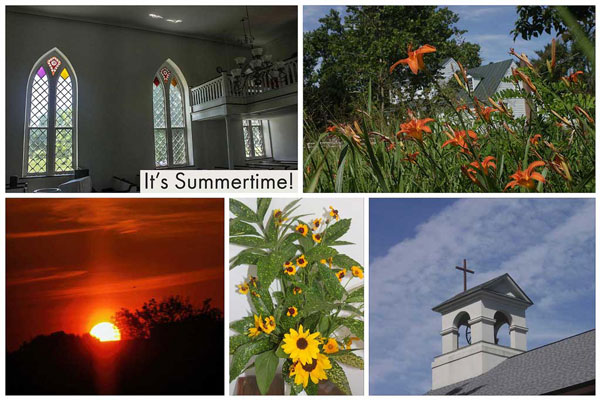Collect for this week – “Almighty God, you have built your Church upon the foundation of the apostles and prophets, Jesus Christ himself being the chief cornerstone: Grant us so to be joined together in unity of spirit by their teaching, that we may be made a holy temple acceptable to you; through Jesus Christ our Lord, who lives and reigns with you and the Holy Spirit, one God, for ever and ever. Amen.”
June 25th – Nativity of John the Baptist

The Birth of John the Baptist, or Nativity of the Forerunner) is a Christian feast day celebrating the birth of John the Baptist, a prophet who foretold the coming of the Messiah in the person of Jesus and who baptized Jesus. The day of a Saint’s death is usually celebrated as his or her feast day, but Jesus, the Virgin Mary and Saint John the Baptist, while not being exceptions to this rule also have feast days that celebrate their earthly birth. The reason is that St. John (Luke 1:15), like the Blessed Virgin, was purified from original sin before his very birth (in Catholic doctrine), though not in the instant of conception as in the latter case.
June 28 – Irenaeus

Irenaeus (125?-202) was an early Church father, having been taught by Polycarp, who had been taught by John the Evangelist.
During the persecution of Marcus Aurelius, the Roman Emperor from 161-180 the clergy of that city, many of whom were suffering imprisonment for the faith, sent him in 177 to Rome with a letter to Pope Eleuterus concerning heresy. While Irenaeus was in Rome, a massacre took place in Lyons. Returning to Gaul, Irenaeus succeeded the martyr Saint Pothinus and became the second Bishop of Lyon, the main trading port for Western Gaul (France). During the religious peace which followed the persecution of Marcus Aurelius, the new bishop divided his activities between the duties of a pastor and of a missionary.
We remember him for two things – his work against Gnosticism and the recognition of the four gospels. He apparently did well there, becoming an influential leader against the rising heterodoxy Gnosticism. He first used the word to describe heresies . The Gnostics saw the world as material, and leaves much room for improvement and they denied that God had made it. They saw Jesus more as a spirit than a real flesh human . Before Irenaeus, Christians differed as to which gospel they preferred. Irenaeus is the earliest witness to recognize the four authentic gospels, the same we have today. Irenaeus is also our earliest attestation that the Gospel of John was written by John the apostle and that the Gospel of Luke was written by Luke, the companion of Paul.
June 29 – Feast of Peter and Paul

The Feast of Saints Peter and Paul commemorates the martyrdom in Rome of the apostles St. Peter and Paul of Tarsus, observed on June 29. The celebration is of ancient origin, the date selected being either the anniversary of their martyrdom in 67AD or of the translation of their relics. They had been imprisoned in the famous Mamertine Prison of Rome and both had foreseen their approaching death. Saint Peter was crucified; Saint Paul, a Roman citizen, was slain by the sword. Together they represent two different Christian traditions.
Why do we remember them ? Peter is pictured on the left with the keys – the keys to the kingdom. In Matthew 16, Christ says ” And so I say to you, you are Peter, and upon this rock I will build my church, and the gates of the netherworld shall not prevail against it. I will give you the keys to the kingdom of heaven.” They keys since then have been symbols of Papal power. Peter represents that part of the Church which gives it stability: its traditions handed down in an unbroken way from the very beginnings, the structures which help to preserve and conserve those traditions, the structure which also gives consistency and unity to the Church, spread as it is through so many races, cultures, traditions, and geographical diversity
Paul is pictured with the Bible. He, on the other hand, represents the prophetic and missionary role in the Church. It is that part of the Church which constantly works on the edge, pushing the boundaries of the Church further out, not only in a geographical sense but also pushing the concerns of the Church into neglected areas of social concern and creatively developing new ways of communicating the Christian message. This is the Church which is constantly renewed, a Church which needs to be constantly renewed


 Beginning on Pentecost 2, we enter the Church year known as Ordinary Time. After Easter, Jesus’s ascension into heaven, and the coming of the Holy Spirit to us at Pentecost, we accept responsibility for being and becoming Christ’s body in the world. We are called by Jesus to live in community, our lives together guided not only by the example of Jesus, but by the guidance of the Holy Spirit.
Beginning on Pentecost 2, we enter the Church year known as Ordinary Time. After Easter, Jesus’s ascension into heaven, and the coming of the Holy Spirit to us at Pentecost, we accept responsibility for being and becoming Christ’s body in the world. We are called by Jesus to live in community, our lives together guided not only by the example of Jesus, but by the guidance of the Holy Spirit.